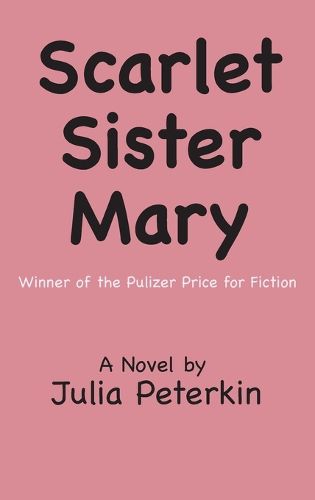Readings Newsletter
Become a Readings Member to make your shopping experience even easier.
Sign in or sign up for free!
You’re not far away from qualifying for FREE standard shipping within Australia
You’ve qualified for FREE standard shipping within Australia
The cart is loading…






This title is printed to order. This book may have been self-published. If so, we cannot guarantee the quality of the content. In the main most books will have gone through the editing process however some may not. We therefore suggest that you be aware of this before ordering this book. If in doubt check either the author or publisher’s details as we are unable to accept any returns unless they are faulty. Please contact us if you have any questions.
Scarlet Sister Mary is a 1928 novel by Julia Peterkin. It won the Pulitzer Prize for the Novel in 1929. The book was called obscene and banned at the Gaffney, South Carolina public library. The Gaffney Ledger newspaper, however, serially published the complete book.
Scarlet Sister Mary is set among the Gullah people of the Low Country in South Carolina. The date is never established, but it appears to be around the beginning of the 20th century. The title character, Mary, was an orphan on an abandoned plantation who was raised by Auntie Maum Hannah and her crippled son Budda Ben. The description of Mary as "Scarlet Sister" reflects the basic conflict in the novel as Mary is torn between her desire to be a member of good standing in the church and a desire to live a life of sin and pleasure.
Julia began writing short stories inspired by the everyday life and management of the plantation. She was described as audacious as well as gracious by Robeson (1995). Peterkin sent highly assertive letters to people she did not know and had never met. For example, she wrote to authors Carl Sandburg and H. L. Mencken, and included samples of her writing about the Gullah culture of coastal South Carolina. Living chiefly on the plantation, she invited Sandburg, Mencken, and other prominent people to the plantation. Sandburg, who lived within a day's travel time in Flat Rock, North Carolina, visited. Although Mencken did not visit, he became Peterkin's literary agent in her early career, a possible testament to her persuasive letters. Eventually, Mencken led her to Alfred Knopf, who published Green Thursday, her first book, in 1924.
In addition to a number of subsequent novels, her short stories were published in magazines and newspapers throughout her career. Peterkin was among the few white authors to specialize in the African-American experience.
$9.00 standard shipping within Australia
FREE standard shipping within Australia for orders over $100.00
Express & International shipping calculated at checkout
This title is printed to order. This book may have been self-published. If so, we cannot guarantee the quality of the content. In the main most books will have gone through the editing process however some may not. We therefore suggest that you be aware of this before ordering this book. If in doubt check either the author or publisher’s details as we are unable to accept any returns unless they are faulty. Please contact us if you have any questions.
Scarlet Sister Mary is a 1928 novel by Julia Peterkin. It won the Pulitzer Prize for the Novel in 1929. The book was called obscene and banned at the Gaffney, South Carolina public library. The Gaffney Ledger newspaper, however, serially published the complete book.
Scarlet Sister Mary is set among the Gullah people of the Low Country in South Carolina. The date is never established, but it appears to be around the beginning of the 20th century. The title character, Mary, was an orphan on an abandoned plantation who was raised by Auntie Maum Hannah and her crippled son Budda Ben. The description of Mary as "Scarlet Sister" reflects the basic conflict in the novel as Mary is torn between her desire to be a member of good standing in the church and a desire to live a life of sin and pleasure.
Julia began writing short stories inspired by the everyday life and management of the plantation. She was described as audacious as well as gracious by Robeson (1995). Peterkin sent highly assertive letters to people she did not know and had never met. For example, she wrote to authors Carl Sandburg and H. L. Mencken, and included samples of her writing about the Gullah culture of coastal South Carolina. Living chiefly on the plantation, she invited Sandburg, Mencken, and other prominent people to the plantation. Sandburg, who lived within a day's travel time in Flat Rock, North Carolina, visited. Although Mencken did not visit, he became Peterkin's literary agent in her early career, a possible testament to her persuasive letters. Eventually, Mencken led her to Alfred Knopf, who published Green Thursday, her first book, in 1924.
In addition to a number of subsequent novels, her short stories were published in magazines and newspapers throughout her career. Peterkin was among the few white authors to specialize in the African-American experience.